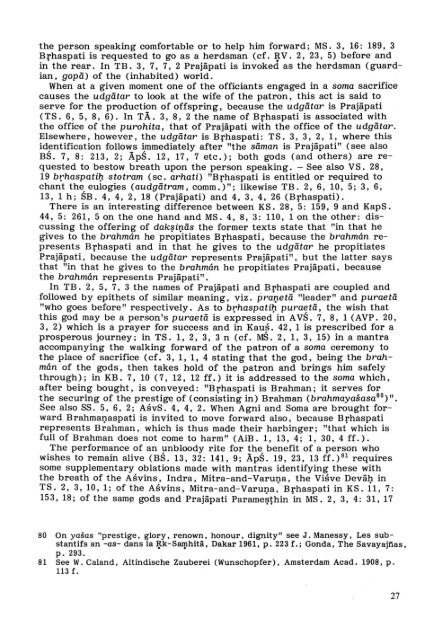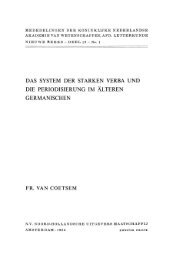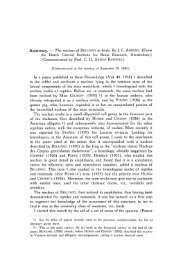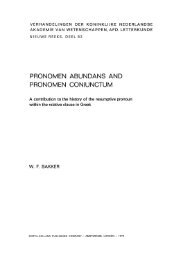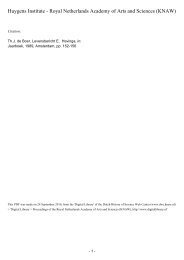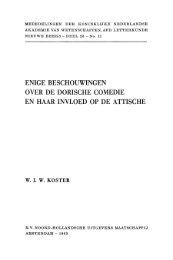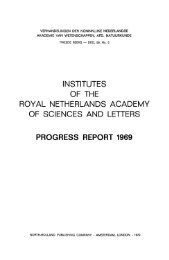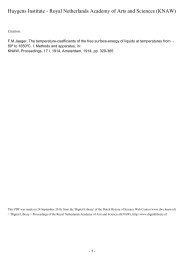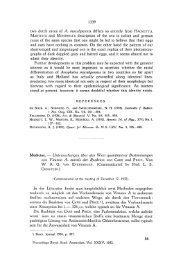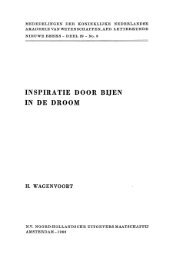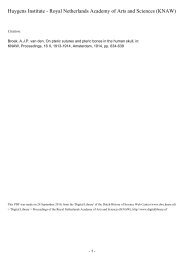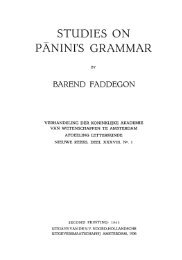Prajapati's relations with Brahman, Brhaspati and Brahma - DWC
Prajapati's relations with Brahman, Brhaspati and Brahma - DWC
Prajapati's relations with Brahman, Brhaspati and Brahma - DWC
You also want an ePaper? Increase the reach of your titles
YUMPU automatically turns print PDFs into web optimized ePapers that Google loves.
the person speaking comfortable or to help him forward; MS. 3, 16: 189, 3<br />
<strong>Brhaspati</strong> is requested to go as a herdsman (cf. ~V. 2, 23, 5) before <strong>and</strong><br />
in the re ar . In TB. 3, 7, 7, 2 Prajäpati is invoked as the herdsman (guardian,<br />
gopä) of the (inhabited) world.<br />
When at a given moment one of the officiants engaged in a soma sacrifice<br />
causes the udgätar to look at the wife of the patron , this act is said to<br />
serve for the production of offspring, because the udgätar is Prajäpati<br />
(TS. 6, 5, 8, 6). In TA. 3,8,2 the name of <strong>Brhaspati</strong> is associated <strong>with</strong><br />
the office of the purohita, that of Prajäpati <strong>with</strong> the office of the udgätar.<br />
Elsewhere, ho wever , the udgätar is <strong>Brhaspati</strong>: TS. 3, 3, 2, 1, where this<br />
identification follows immediately after "the säman is Prajäpati" (see also<br />
BS. 7,8: 213,2; ApS. 12, 17, 7 etc.); both gods (<strong>and</strong> others) are requested<br />
to bestow breath upon the person speaking. - See also VS. 28,<br />
19 brhaspati1). stotram (sc. arhati) "<strong>Brhaspati</strong> is entitled or required to<br />
chant the eulogies (audgätram, comm.)"; likewise TB. 2, 6, 10, 5; 3, 6,<br />
13, 1 h; SB. 4, 4, 2, 18 (Prajäpati) <strong>and</strong> 4, 3, 4, 26 (<strong>Brhaspati</strong>).<br />
There is an interesting difference between KS. 28, 5: 159,9 <strong>and</strong> KapS.<br />
44, 5: 261,5 on the one h<strong>and</strong> <strong>and</strong> MS. 4, 8, 3: 110, Ion the other: discussing<br />
the offering of dak{li1)äs the former texts state that "in that he<br />
gives to the brahmán he propitiates <strong>Brhaspati</strong>, because the brahmán represents<br />
<strong>Brhaspati</strong> <strong>and</strong> in that he gives to the udgätar he propitiates<br />
Prajäpati, because the udgätar represents Prajäpati", but the latter says<br />
that "in that he gives to the brahmán he propitiates Prajäpati, because<br />
the brahmán represents Prajäpati".<br />
In TB. 2, 5, 7, 3 the names of Prajäpati <strong>and</strong> <strong>Brhaspati</strong> are coupled <strong>and</strong><br />
followed byepithets of similar meaning, viz. pra1)etä "leader" <strong>and</strong> puraetä<br />
"who goes before" respectively. As to brhaspati1). puraf}tä, the wish that<br />
this god may be a person' s p urae tä is expressed in A VS. 7, 8, 1 ( AVP. 20,<br />
3, 2) which is a prayer for success <strong>and</strong> in Kaus. 42, 1 is prescribed for a<br />
prosperous journey; in TS. 1,2,3,3 n (cf. MS. 2, 1, 3, 15) in a mantra<br />
accompanying the walking forward of the patron of a soma ceremony to<br />
the place of sacrifice (cf. 3, 1, 1, 4 stating that the god, being the brahmán<br />
of the gods, then takes hold of the patron <strong>and</strong> brings him safely<br />
through); in KB. 7, 10 (7, 12, 12 ff.) it is addressed to the soma which,<br />
after being bought, is conveyed: "<strong>Brhaspati</strong> is <strong><strong>Brahma</strong>n</strong>; it serves for<br />
the securing of the prestige of (consisting in) <strong><strong>Brahma</strong>n</strong> (brahmayasasa 80 )".<br />
See also SS. 5, 6, 2; ÀsvS. 4, 4, 2. When Agni <strong>and</strong> Soma are brought forward<br />
<strong>Brahma</strong>ryaspati is invited to move forward also, because <strong>Brhaspati</strong><br />
represents <strong><strong>Brahma</strong>n</strong>, which is thus made their harbinger; "that which is<br />
full of <strong><strong>Brahma</strong>n</strong> does not come to harm" (AiB. 1, 13, 4; 1, 30, 4 ff.).<br />
The performance of an unbloody rite for the bene fit of a person who<br />
wishes to remain alive (BS. 13, 32: 141,9; ApS. 19,23, 13 ff.)81 requires<br />
some supplementary oblations made <strong>with</strong> mant ras identifying these <strong>with</strong><br />
the breath of the Asvins, Indra, Mitra-<strong>and</strong>-Varuna, the Visve Deväh in<br />
TS. 2, 3,10,1; of the Asvins, Mitra-<strong>and</strong>-Varurya:<strong>Brhaspati</strong> in KS. Ü, 7:<br />
153,18; of the sam~ gods <strong>and</strong> Prajäpati Parame!}thin in MS. 2, 3, 4: 31,17<br />
80 On yasas "prestige. glory. renown. honour. dignity" see J. Manessy, Les substantifs<br />
an -as- dans la I.tk-SllJ!Ihitä. Dakar 1961, p. 223 f.; Gonda, The Savayajt'ias.<br />
p. 293.<br />
81 See W. Cal<strong>and</strong>. Altindische Zauberei (Wunschopfer). Amsterdam Acad. 1908. p.<br />
113f.<br />
27


